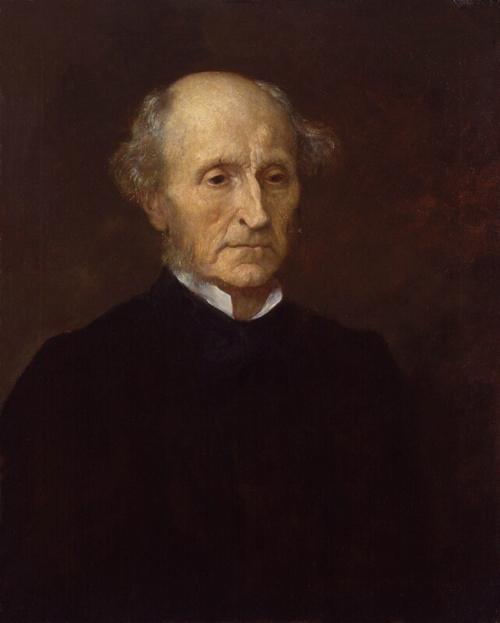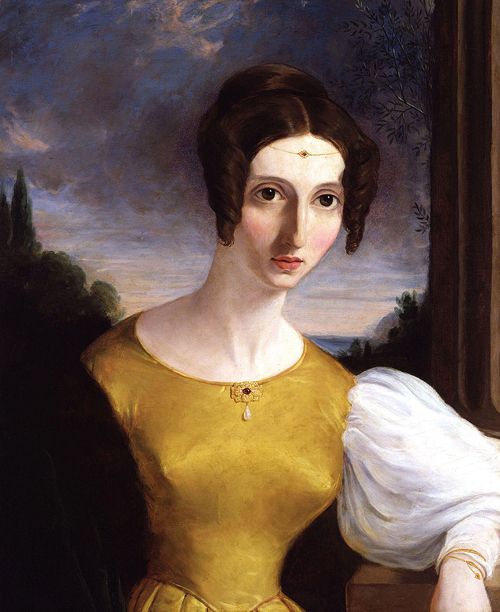
Your complimentary articles
You’ve read one of your four complimentary articles for this month.
You can read four articles free per month. To have complete access to the thousands of philosophy articles on this site, please
Brief Lives
John Stuart Mill (1806-1873)
Alistair MacFarlane looks at a man who applied his thought to his life.
Mill and the concept of liberty are forever linked, but his tyrannical father sought to deprive him of it. In later life, when asked if he had ever played cricket, he replied wistfully that he never had a childhood, had no friends of his own age, and had never been allowed time for frivolous things. The lonely boy was made into a prodigy, and as a result grew up to view society in largely abstract terms. Later events dramatically converted him into a powerful advocate for radical social change.

John Stuart Mill by George Frederick Watts 1873
Early Life
John Stuart Mill was born on 20 May 1806 in Pentonville, a suburb of London. He was the eldest of the nine children of James Mills and Harriet (née Burrow). His father, who originally trained as a church minister in Scotland, came to London to become a journalist, met the utilitarian philosopher Jeremy Bentham (1748-1832), and became his dedicated supporter and collaborator. James Mill struggled to make a living as a writer until his History of India (1818) brought him to the attention of the East India Company. Over the following years his ability and diligence enabled him to become the company’s Chief Examiner (head of its Examiner’s Office, which scrutinised and authorised all company transactions). This gave him both financial security and enough free time to try to make his eldest son a prodigy. In this he succeeded beyond any reasonable expectation, although at a huge cost to the child. John Stuart began to learn Greek at the age of three, and had thoroughly mastered both it and Latin by the age of eleven. After a wide survey of history, he embarked on a study of logic, mathematics and economics. All this was achieved under his father’s tutelage and Bentham’s encouragement. By fifteen Mill had become an accomplished all-round scholar, and started original work. He began by putting together Bentham’s fragmentary expositions of utilitarianism into a coherent and systematic form, so launching his independent literary and philosophical career. In 1823, when Mill was seventeen, his father secured him a position in the East India Company. John’s prodigious ability and capacity for work ensured a steady rise through the company ranks until he succeeded his father as Chief Examiner in 1856. In 1858 Mill retired from the company with a comfortable pension, and turned his attention to politics. He was elected as Member of Parliament for Westminster, and entered the House of Commons in 1865.
Soon after starting work with the East India Company in 1823, Mill had a traumatic experience that haunted him for the rest of his life. Walking across London’s St James Park on his way to work he noticed a bundle of clothes lying under a tree. Investigating it, he found the body of a strangled new-born baby. Reporting his dreadful discovery, he was appalled by the indifference with which this then commonplace event was received. Mill immediately began the first of the campaigns that made him a scourge of Victorian indifference and hypocrisy: he distributed a pamphlet, describing and advocating contraception, throughout the working class districts of London. He was soon arrested, charged with obscenity, convicted, and briefly imprisoned. A man who would later become one of the foremost public intellectuals of his time had acquired a criminal record at the age of seventeen. His family and their influential friends managed such an effective damage-limitation exercise that no public discussion of the incident took place until a vindictive obituary appeared in The Times fifty years later. Although ingenuously presented there as no more than a youthful indiscretion, this completely missed its crucial significance. Mill became at that moment, and remained, a passionate man of action.
Mill inevitably suffered a severe reaction to his rigorous childhood and difficult adolescence, and in 1830 became profoundly depressed. Although continuing to work, he lost all ambition and interest. But slowly and surely he came to realise that although his situation may have been caused by his father, any solution must lie in his own hands. He abandoned his treadmill and began to read widely and for pleasure. His connection with Bentham gave him an entry to the salons that were springing up in London, and for which intellectuals were in great demand. And in one of them he met Harriet Taylor, who transformed his life. Her husband John was a successful pharmacist, a supporter of Bentham, and a former neighbour of the Mills. The Taylors, although they met together for literary and philosophical events, lived apart. Harriet was also much taken by Mill, and they rapidly moved from intellectual partnership to a close, intimate relationship. John Taylor remained remarkably tolerant of what he may have considered a platonic friendship, but which others saw as scandalous. In particular, Mill’s father violently, but vainly, objected, and his hold over his son was broken. Harriet and Mill were inseparable for the next twenty years, and married in 1851, two years after John Taylor’s death, by which time Mill was completely estranged from his family. Harriet was a brilliant intellectual in her own right and changed both Mill’s life and his philosophy. She led him to grasp the possibilities for men and women, and for all classes of society, of a progressive development of individuality as the main goal in life. Harriet became indispensable to his thought, his developing humanity, and his determination to act. Mill was utterly distraught when in 1858, during a tour of Europe, Harriet fell ill and died in Avignon, where she was buried. He bought a house there and for the rest of his life spent many months in it every year, in order to be near her grave.

Harriet Taylor Mill (1807-1858) in National Portrait Gallery
Philosophy & Politics
Mill was an empiricist who sought to extend knowledge based on experience into social and moral domains. His politics was a passionate attempt to put his philosophy into practice. His youthful systematisation of Bentham’s philosophy was eventually published as Utilitarianism in 1863. Mill’s utilitarian argument is simply expressed: “Actions are right in proportion as they tend to promote happiness, wrong as they tend to promote a reverse of it.” Bentham’s attempts to produce a workable quantitative basis for ethics had foundered, and his ‘calculus of felicity’ had become an object of ridicule. Mill’s more nuanced approach fared little better. All Mill’s other great works were launch pads for his political advocacy. The greatest was the magnificent On Liberty (1859).
Liberty rests on a bargain struck between individuals and the society they live in. The bargain can be specified in complementary ways: by listing rights – things that should be done – or by listing wrongs, which may not be done. The two approaches are comprehensively discussed in a famous essay by Isaiah Berlin, Two Concepts of Liberty (1969). Berlin called them positive and negative forms of liberty – what I can do and what I am to be protected from, respectively. Mill was a committed advocate of minimising the list of things which society forbade. In his own words: “The sole end for which mankind is warranted, individually or collectively, in interfering with the liberty of action of any of their number is self protection. The only purpose for which power may be rightly exercised over any member of a civilised community, against their will, is to prevent harm to others. Over themselves the individual is sovereign.” On Liberty was his masterpiece, and remains an inspiring defence of liberal views. During the seven years of his married life, Mill produced three other great works: Thoughts on Parliamentary Reform (1859), Utilitarianism (1863), and The Subjugation of Women (1869).
When Mill agreed to stand as a parliamentary candidate in 1865, it was on conditions strictly in accord with his narrowly conceived principles. He refused to canvas, or to allow agents to canvas on his behalf, and flatly refused to become involved in the local affairs of his constituency. It was only with great difficulty that he was persuaded to address a meeting of his electors. He was elected anyway, but any prospect of a conventional political career soon vanished. In parliament he proved a less effective speaker than expected, though willing to enter argumentative debate. His failure in parliament doomed any prospect of ministerial office, and he lost his seat in the election of 1868. Yet despite this severe setback, Mill’s political influence continued to grow through his writings, during the remainder of his lifetime and afterwards. Although his contributions to logic, metaphysics and economics have long been overtaken by modern specialists, Mill played a crucial role in developing a fertile ground in which modern liberal democracy has flourished. While he never reached the highest peaks of either philosophy or politics, nobody has been more effective than Mill in combining both to great and lasting effect.
Last Days
Mill spent the last four years of his life in Monloisir, his house in Avignon. To the dismay of future biographers he destroyed many of his records and most of his old correspondence. He continued his forthright and unceasing advocacy of women’s rights, and expressed a deepening dissatisfaction with the Liberal party and Gladstone. In 1871, as a reluctant pallbearer at the funeral of an old Benthamite colleague George Grote in Westminster Abbey, he turned to a friend and said: “In no very long term I shall be laid in the ground in a very different way.” Despite this pessimism, Mill retained most of his energy for the following two years. Then, in early May 1873 he developed “an enormous swelling over his face and neck”. Mill had contracted erysipelas, a then-incurable bacterial infection. He died on 8 May 1873 at the age of 66, and was buried beside his wife.
Epilogue
Mill was never able fully to resolve the contradictions and tensions in his philosophy and his life which resulted from his harsh childhood: between rationality and emotion, between reflection and action, and between philosophy and politics. Like Bertrand Russell, he was a public intellectual and a focus of political resentment. Unlike Russell, his political legacy is greater than his philosophical one. Mill gave a magnificent defence of individual liberty on two complementary grounds: that it enables individuals to realise their potential in the way they themselves believe best, and that by liberating talent, creativity, and imagination it creates a basis for moral progress. For this, we should be forever grateful.
© Sir Alistair MacFarlane 2018
Sir Alistair MacFarlane is a former Vice-President of the Royal Society and a retired university Vice-Chancellor.









